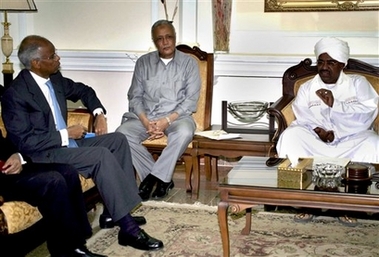Sudan OKs peacekeepers in Darfur
Updated: 2006-12-23 08:11
KHARTOUM, Sudan - The Sudanese government has agreed to UN involvement in a peacekeeping operation in its troubled Darfur region, the Foreign Ministry said Friday, in what appeared to be a scaled back version of the mission originally requested by the UN.
He didn't specify how many troops would be accepted but said the bulk of the force would come from African Union countries, with the UN mainly providing technical assistance, consultants and military and police experts. He added that the force would be commanded by the African Union.
The comment reflected his government's long standing opposition to the deployment of 20,000 UN troops in Darfur, as proposed by the UN Security Council.
In deference to Khartoum's opposition, the UN scaled back its plans to replace the current AU force of 7,000 troops in Darfur with the much bigger UN operation. Since early November, has been pushing to reinforce the existing peacekeepers with smaller numbers of UN personnel as well as technical and financial assistance.
Some Sudanese officials in recent weeks had expressed approval for a UN force but others had raised questions, leaving it unclear if Friday's announcement would undergo further changes.
The violence in Darfur began in February 2003 when rebels from African tribes took up arms, complaining of discrimination and oppression by the Arab-dominated government. The government is accused of unleashing an Arab militia, the janjaweed, against the ethnic African community in a campaign of murder, rape and arson.
More than 200,000 people have been killed and 2.5 million displaced in the fighting, which has escalated since the May accord.
The government denies backing the janjaweed, but UN and A.U. officials have accused Khartoum of arming the militia and coordinating regular army attacks with it.
Earlier Friday, UN Secretary-General Kofi Annan said he believed the Sudan government had also agreed to make renewed efforts to enforce a cease-fire and negotiate peace with those Darfur rebels who rejected the peace agreement of May. Annan said he had heard that President Omar al-Bashir would approve "a full cease-fire, a renewed effort to bring all parties into (the) political process, and deployment of the proposed African Union- United Nations hybrid force."
Al-Magli said his government had not yet seen Annan's statement, but it was true that "Sudan has confirmed to the (UN) envoy that it would sit down for peace talks with the rebel factions any time, any where."
"In fact, a government delegation went to Asmara, Eritrea, on Thursday to look into the possibility of talking to those groups that did not sign the Abuja peace agreement," al-Magli said, referring to the May accord between the government and one Darfur rebel group.
The world "should pressurize the other factions which are attacking the government, humanitarian and civilian communities, to come to cease-fire talks and to stop attacking. But for us in the government, yes, we have confirmed our commitment to the ceasefire," al-Magli said.
|
||
|
||
|
|

